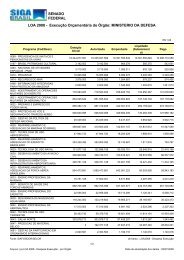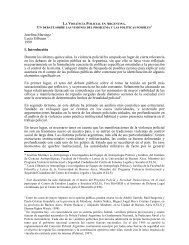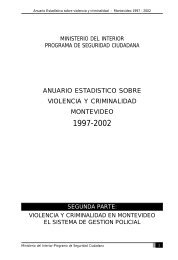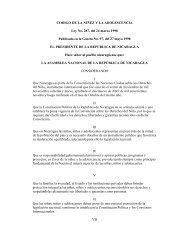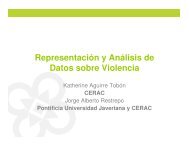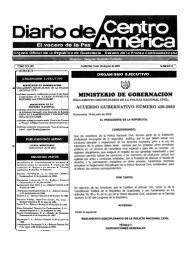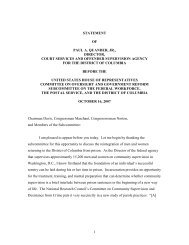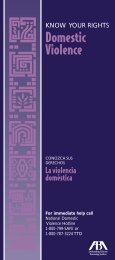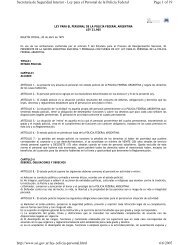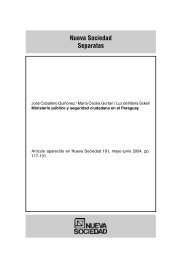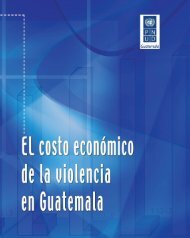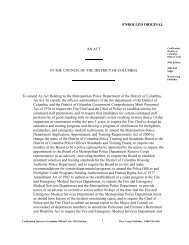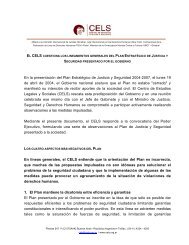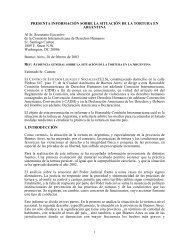Venezuela: The Life and Times of the Party System - Political ...
Venezuela: The Life and Times of the Party System - Political ...
Venezuela: The Life and Times of the Party System - Political ...
You also want an ePaper? Increase the reach of your titles
YUMPU automatically turns print PDFs into web optimized ePapers that Google loves.
In <strong>the</strong> Chamber <strong>of</strong> Deputies, <strong>the</strong> population base for a seat is equal to 0.55 percent <strong>of</strong> <strong>the</strong><br />
total national population. <strong>The</strong> number <strong>of</strong> deputies per district varies, <strong>and</strong> is arrived at by dividing<br />
<strong>the</strong> number <strong>of</strong> inhabitants by <strong>the</strong> population base. Deputies from districts are elected by <strong>the</strong><br />
method <strong>of</strong> <strong>the</strong> electoral quotient via <strong>the</strong> d’Hondt system. 1 Although <strong>the</strong> Constitution <strong>of</strong> 1961<br />
explicitly refers to ‘additional’ representatives only in <strong>the</strong> case <strong>of</strong> <strong>the</strong> Senate, this formula has also<br />
been applied to <strong>the</strong> election <strong>of</strong> federal deputies. Additional seats in <strong>the</strong> lower chamber are<br />
distributed using <strong>the</strong> national electoral quotient for deputies. Under <strong>the</strong> new law, <strong>the</strong> number <strong>of</strong><br />
additional increased from four to five. 2<br />
Because voting is m<strong>and</strong>atory, <strong>the</strong> state is obliged to provide citizens with <strong>the</strong> resources<br />
necessary to guarantee its effective exercise. <strong>The</strong> Supreme Electoral Council (CSE), created in<br />
1936, is central to <strong>the</strong> successful institutionalization <strong>and</strong> effective functioning <strong>of</strong> <strong>the</strong> <strong>Venezuela</strong>n<br />
electoral system. 3 <strong>The</strong> CSE is widely respected, <strong>and</strong> operates with representation from all<br />
parties, who toge<strong>the</strong>r staff voting tables at election time. Elections have been transformed into a<br />
source <strong>of</strong> legitimation for <strong>the</strong> political system largely because <strong>the</strong>re exist guarantees that <strong>the</strong>y will<br />
be conducted with impartiality <strong>and</strong> responsibility. 4<br />
<strong>The</strong> financing <strong>of</strong> party activities <strong>and</strong> campaigns has become increasingly controversial.<br />
Campaign funds come principally from four sources: regular contributions by party members;<br />
private contributions; state resources; <strong>and</strong> <strong>the</strong> Supreme Electoral Council. <strong>The</strong> financing <strong>of</strong> party<br />
activities rests largely on private donations <strong>and</strong> on <strong>the</strong> discretionary use <strong>of</strong> public funds by <strong>the</strong><br />
party in power. Contributions by party activists are minimal, <strong>and</strong> funds provided by <strong>the</strong> CSE<br />
1 Under <strong>the</strong> d’Hondt formula, a party’s total vote in each constituency is divided by<br />
consecutive divisors (1, 2, 3, etc.) <strong>and</strong> each party’s resulting quotients are arranged in<br />
numerically descending order, with seats awarded successively to <strong>the</strong> party with <strong>the</strong> highest<br />
quotient, until all seats have been distributed by party lists [Ley Orgánica del Sufragio, article 13].<br />
2 <strong>The</strong> national electoral quotient is determined by dividing <strong>the</strong> total number <strong>of</strong> valid votes in <strong>the</strong><br />
country by <strong>the</strong> fixed total <strong>of</strong> seats available in <strong>the</strong> Chamber <strong>of</strong> Deputies, following <strong>the</strong> established<br />
population base. <strong>The</strong> seating <strong>of</strong> additional deputies is achieved by dividing <strong>the</strong> total number <strong>of</strong><br />
valid votes won by each national party by <strong>the</strong> electoral quotient. If <strong>the</strong> difference between this<br />
result <strong>and</strong> <strong>the</strong> number <strong>of</strong> seats won by <strong>the</strong> party around <strong>the</strong> country is 1, 2, 3, or 4, or more, <strong>the</strong>n<br />
<strong>the</strong> party gains up to four additional seats. <strong>The</strong> names <strong>of</strong> <strong>the</strong> deputies are drawn from party lists<br />
in districts where <strong>the</strong> party failed to win representation or where <strong>the</strong>re was a discrepancy between<br />
<strong>the</strong> number <strong>of</strong> votes <strong>the</strong> party obtained <strong>and</strong> <strong>the</strong> number <strong>of</strong> seats it won outright [Ley Orgánica del<br />
Sufragio, article 15].<br />
3 <strong>The</strong> Supreme Electoral Council is charged with coordinating all stages <strong>of</strong> <strong>the</strong> electoral<br />
process: voter registration, c<strong>and</strong>idates, electoral legislation, internal party disputes, voting itself,<br />
<strong>and</strong> above all with guaranteeing <strong>the</strong> regularity <strong>and</strong> fairness <strong>of</strong> elections. <strong>The</strong> Council is<br />
composed <strong>of</strong> nine members who serve for terms <strong>of</strong> five years. <strong>The</strong>y are named by Congress,<br />
with five being nominated by <strong>the</strong> parties who received <strong>the</strong> largest share <strong>of</strong> <strong>the</strong> vote in <strong>the</strong> most<br />
recent election. <strong>The</strong> four remaining members are nonpartisan <strong>and</strong> are elected by a two-thirds<br />
vote <strong>of</strong> Congress. National parties receiving at least 3 percent <strong>of</strong> <strong>the</strong> vote in <strong>the</strong> most recent<br />
elections may also designate a representative to <strong>the</strong> council. This representative has <strong>the</strong> right to<br />
active voice only, not vote [Ley Orgánica del Sufragio, articles 38 <strong>and</strong> 39].<br />
4 Even admitting <strong>the</strong> possibility <strong>of</strong> fraud at <strong>the</strong> level <strong>of</strong> local electoral boards, this does not<br />
appear to have any significant effect on <strong>the</strong> results <strong>of</strong> <strong>the</strong> weakest competitors in elections. See<br />
Molina <strong>and</strong> Vaivads (1989).



